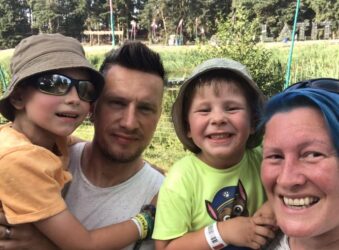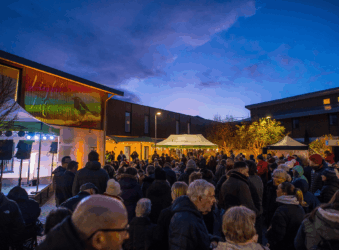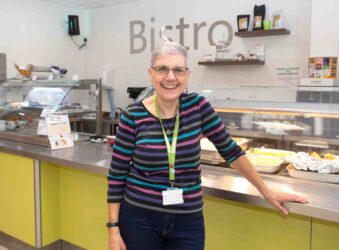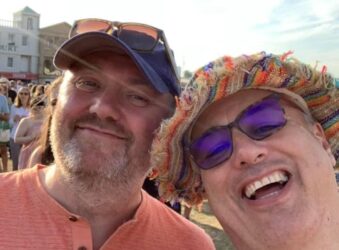Cultural Beliefs observed by Hospice at Home Team
Share this story
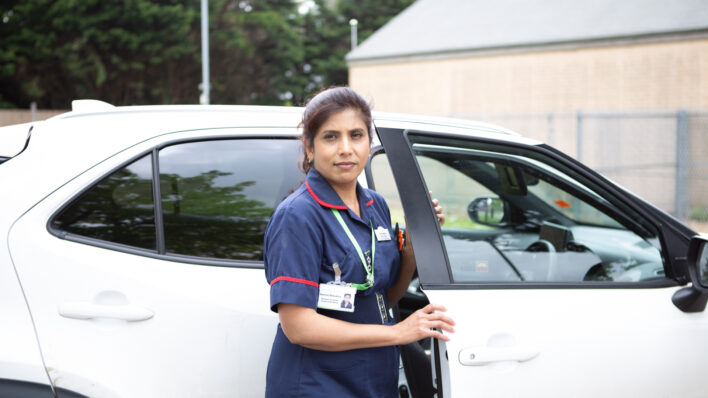
We know that, when the time comes, many people would prefer to die at home with their loved ones and familiar things around them. Our Hospice at Home teams work closely with your GP and District Nurse to make this possible.
Our compassionate team of Healthcare Assistants (HCAs) and Nurses are experts in the practicalities and complexities of end of life care and support people at the end of life, to die in their own home if they wish.
One such patient was Ali (not his real name), a 90-year-old man, who was referred to Hospice at Home (H@H). Ali had a diagnosis of stage 4 lung cancer and stage 5 Chronic Kidney Disease, which he was undergoing dialysis treatment for three days a week.
He was a Muslim by faith. Punjabi was his first language and he also spoke Urdu and a little English. Ali lived with some members of his extended family, with more members of the family living close by, so was very well supported. His family members translated for him during visits and were his advocates on the telephone during assessments.
Ali was diagnosed in July 2024 and referred to H@H care in August, therefore the time from diagnosis to referral was very short, which had a significant psychological impact on both Ali and his family.
During the initial assessment, it became clear that although Ali was pleased to see the nurse, he did not really understand the situation and was sometimes repetitive in his speech, asking his family why he was not at home and not responding directly to the nurse. Ali’s Grandson explained that the family felt that he had dementia, but this was undiagnosed. Ali smoked throughout the assessment and the family were initially concerned that we would try and make him stop smoking. Reassurance was given that this was not the case and that the H@H team were there in a supportive role, to work with him and his family in a collaborative way, to achieve the best outcome for Ali and his loved ones.
Initially Ali was quite independent but relied heavily on ‘Aunty’ to help him with his personal care. He did not want anyone else to help him, but this was becoming quite challenging for Aunty, as she had her own health concerns. For this reason, the carers were introduced slowly over a few days a week. Initially Ali declined their input but gradually, as trust and the therapeutic relationship was built, he started to let the carers perform his care.
The H@H staff continued to offer him choice, which was important to his religious and cultural belief, ie: offering water to wash his hands prior to washing his face and limbs, offering him his cigarettes before giving him breakfast, as Ali preferred to have his cigarette first thing in the morning. They continued to talk to him in broken Urdu, taught by his Grandson ie: “Hello, how are you?” etc.
The H@H Lead, Sheetal also continued to contact Ali and spoke in his native language to continue to review his care needs and offer support.
Over a period of 4-6 weeks, a therapeutic relationship was formed between Ali, his extended family members and the H@H team – resulting in Ali accepting care and support.
Ali continued to attend hospital appointments for dialysis and whilst unfortunately the treatment was unsuccessful, his family supported his decision to continue treatment, as they respected this was important to his religious and cultural beliefs. At this stage Ali became very tired, exhausted and his mobility deteriorated rapidly, making it difficult for him to attend his hospital dialysis appointments.
For this reason, it was important to have a difficult conversation with Ali and his family, in his own language, to ensure he could make an informed decision regarding his deterioration and treatment options. Following this discussion, Ali accepted increased care calls, four times a day and night, as per his care needs. Ali consented to discontinue his dialysis treatment.
Ali passed away peacefully and pain free at home. The family were extremely grateful for the support the H@H team provided, especially the psychological support and respect of their religious belief.
Sheetal commented:
“This is a great example of how the Charity makes every moment count for individual patients and their families. It was a pleasure to care for Ali and support his family, at same time as respecting his personal and cultural beliefs.”
For more information about the Charity’s services please visit arhc.org.uk/services
View other stories
-

Husband runs in memory of his wife and sons’ mummy
Matt Sugg runs TTP Cambridge Half Marathon in memory of his late wife Amy Sugg
-

Comfort and Light at Hospice’s ‘Light up a Life’ Celebration
Light up a Life brought the community together to remember loved ones
-

Hospice Volunteer cycles from London to Paris to support patients care
Debbie shares her motivation for signing up to the London to Paris challenge
-

Hospice Supporter signs up for Trek in memory of his ‘Chum’
Derek Gammage shares his reason for taking on the Cambridge to Ely Trek for his Chum Derek Isaac's
